About BILT: Our approach | Themes | Who we are
Get involved: News and events | BILT community | Expert group | Self-Reflection Tool
Knowledge base: Innovative and promising practices | Atlas of emerging trends | BILT library | TVETipedia

On 27 and 28 April 2021, the BILT team was delighted to host together with Temasek Polytechnic from Singapore the Bridging Asia-Pacific and Europe: New Qualifications and Competencies in TVET conference, a 3D online event that explored different aspects related to identification, integration and implementation of new qualifications and competencies in TVET.
In her welcoming remarks, UNESCO-UNEVOC Director Soo-Hyang Choi called on participants to focus on “the sharing of experiences between Europe and Asia-Pacific.”
Involving the entire competencies ecosystem
The conference’s presentations and dialogues revealed many interesting insights, but the competencies ecosystem and the need to shorten the line of sight between identification of new qualifications and competencies and their implementation were recurring concepts.
Conference participants shared several benefits of the ecosystem approach. For example, speakers discussed how government efforts to take large-scale strategic action on climate change had made it easier to implement greening competencies in TVET curricula, and highlighted the essential participation of local communities and industry stakeholders for the success of online learning. Inputs from different groups of stakeholders are due to increase the responsiveness and relevance of TVET systems.
Another recurring theme throughout the conference was the need to bridge the gap between graduates’ competencies and industry needs. “The issue of getting the right skill to match with the requirement of industry becomes one of the critical factors that affects employability as well as getting TVET graduates to move forward,” said Dato Palani, Head of the ASEAN Future Workforce Council.
In order to close the gap between the demand and supply of new qualifications and competencies, one crucial factor mentioned in several discussions was the additional need for TVET staff to remain closely familiar with the latest industry trends and insights to ensure instruction is up to date.
The Bridging Asia-Pacific and Europe conference was full of opportunities for interaction between speakers and participants, which fostered mutual learning and thoughtful takeaways. Key elements of the rich discussions and presentations that took place in the plenary as well as in the breakout rooms were captured in a series of graphic recordings created live during the event. The full recordings of the sessions are available at the conference venue![]() .
.
The BILT team is looking forward to welcoming UNEVOC Centres and other TVET stakeholders to the Bridging Africa and Europe: New Qualifications and Competencies in TVET, a similar online conference that will be held on 15-16 June 2021. The official announcement and invitations will follow soon.

- a UNEVOC Centre -
Day 1, 27 April 2021 | |
 | Welcome remarks Ms Soo-Hyang Choi, Director, UNESCO-UNEVOC Mr Aw Tuan Kee, Senior Director, Temasek Polytechnic, Singapore Ms Catrin Hannken, Deputy Director-General for Vocational Training, Federal Ministry of Education and Research (BMBF), Germany Key note Mr Brajesh Panth, Chief, Education Sector Group, Asian Development Bank, on  "Workforce Development in Light of IR4.0, Educational Levels, and Migration" "Workforce Development in Light of IR4.0, Educational Levels, and Migration"Objective: understand the major trends impacting the world of work in Asia and how differences in technology, educational levels and migration affect the regional economy. |
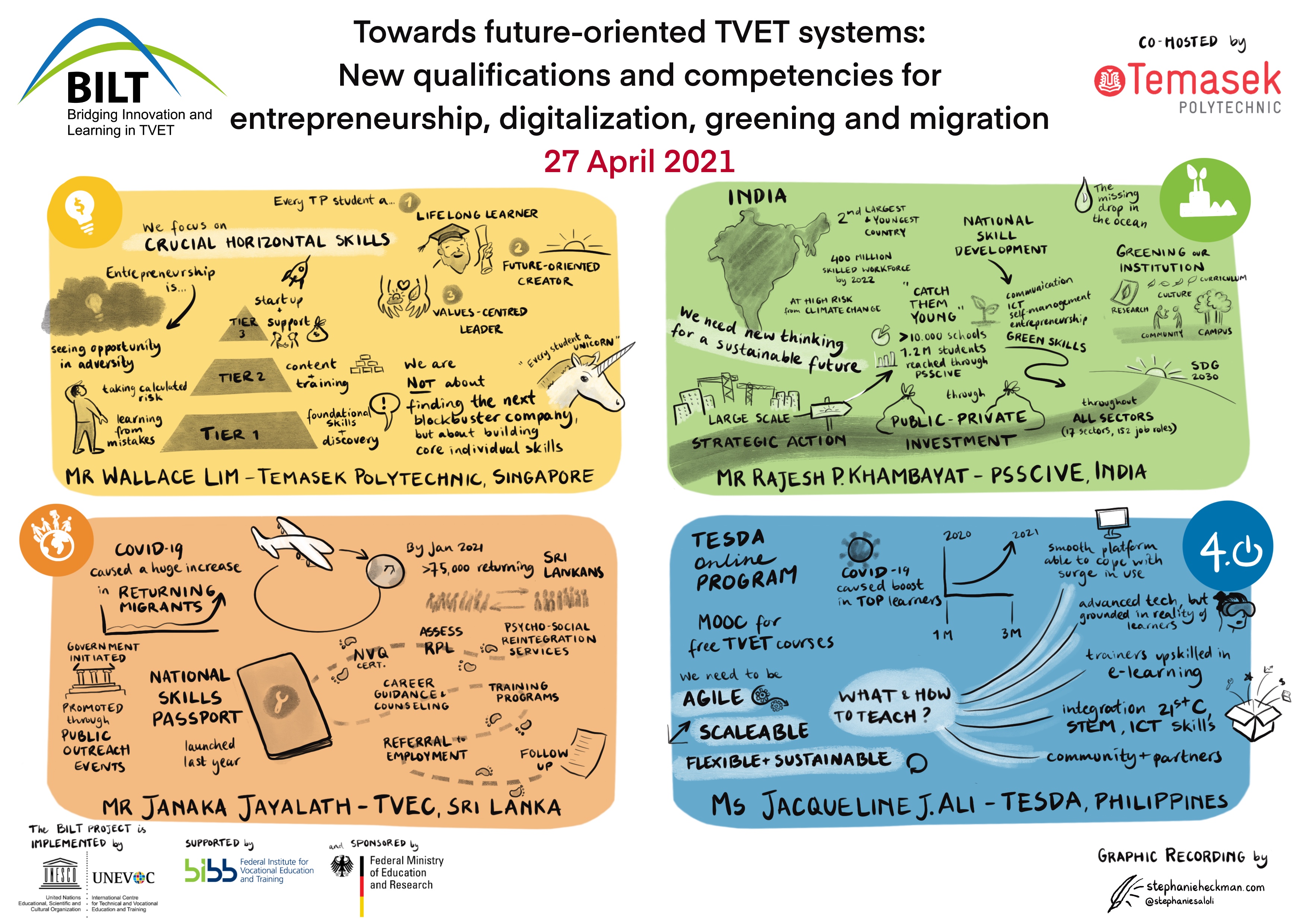 | Towards future oriented TVET systems: New qualifications and competencies for entrepreneurship, digitalization, greening and migration Moderated by Ms Jolien van Uden, Human Capital Development Specialist – Innovative Teaching and Learning, European Training Foundation (ETF) Objective: present innovative practices that address the themes of digitalization, greening, entrepreneurship and migration, highlighting relevant aspects related to the identification, integration and implementation of new qualifications and competencies. Presented by:
|
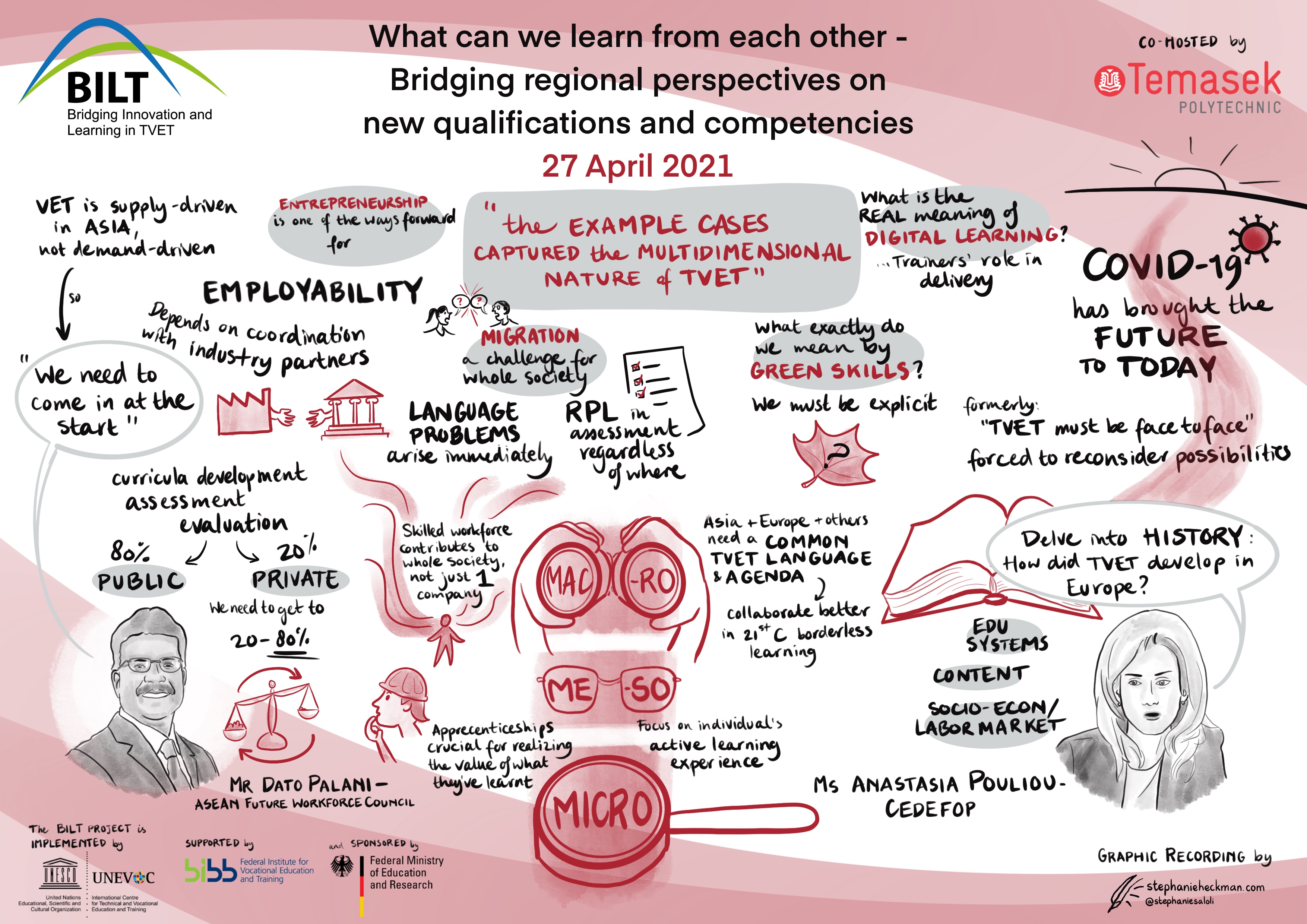
| What we can learn from each other – Bridging regional perspectives on new qualifications and competencies Moderated by Ms Jolien van Uden, ETF Objective: highlight and synthesize the main learnings from the four initiatives and their discussion. Explore how Europe and Asia and the Pacific can benefit from each other’s experience regarding the identification, integration and implementation of new qualifications and competencies in TVET. Podium speakers:
|
Day 2, 28 April 2021 | |
 | Introduction: New qualifications and competencies – a continuous challenge & opportunity for TVET systems Mr Dieter Euler Mr Dieter EulerObjective: underline the importance of improving the intersections between the world of work and the world of education; understand the frame conditions for the process of identification, integration and implementation of new qualifications and competencies, which enables TVET systems to respond accurately and promptly to the needs of society. |
|
Parallel breakout sessions Objective: delve into the process of identifying, integrating and implementing new qualifications and competencies, while exploring the limits and possibilities set by the major trends affecting TVET in Asia and Europe. | |
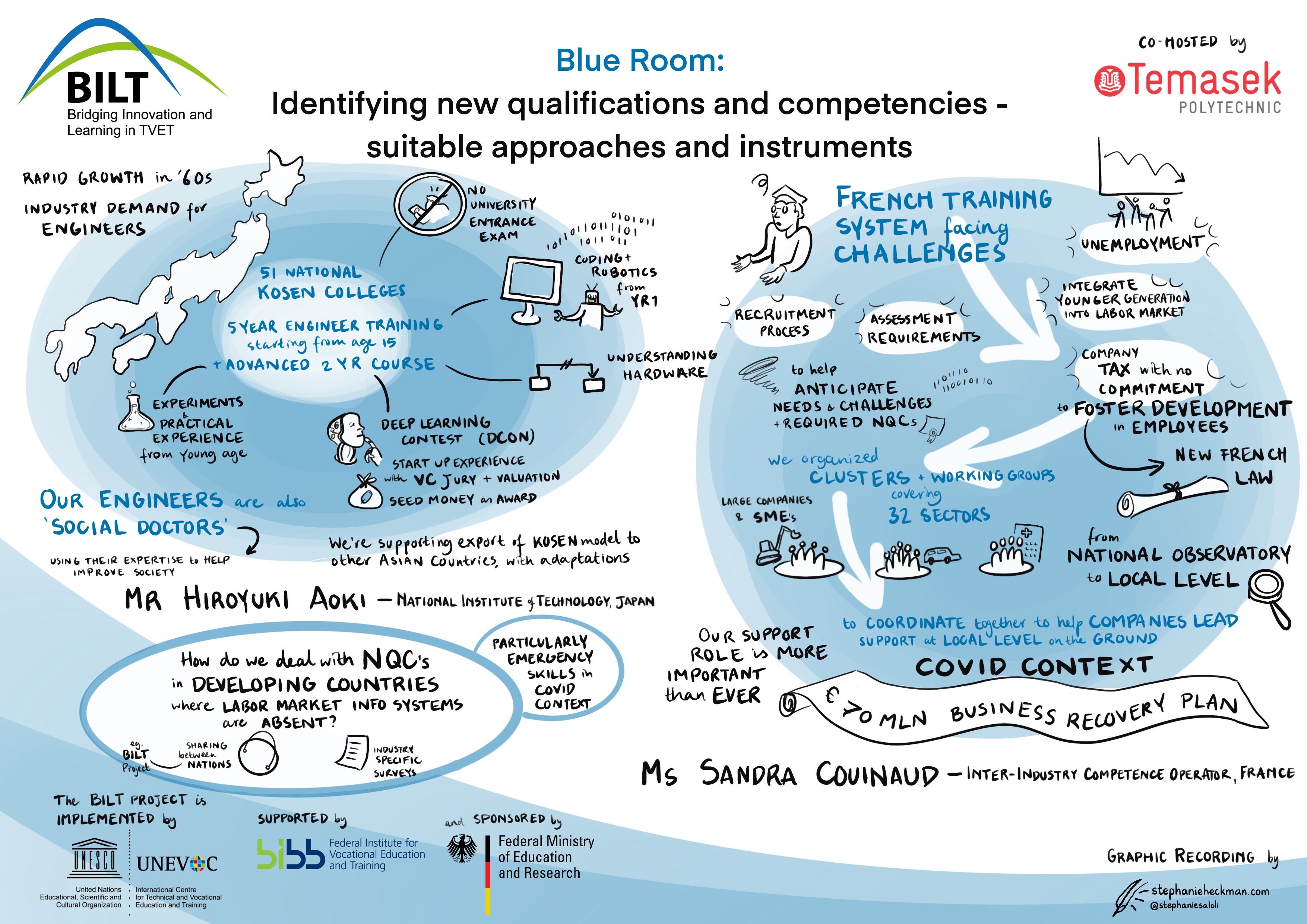 |
Blue Room: Identifying new qualifications and competencies - suitable approaches and instruments Moderated by Mr Philip Loveder, Executive Manager, Inform and Engage, National Centre for Vocational Education Research (NCVER), Australia Objective: explore challenges and solutions faced by TVET systems in identifying relevant and future-oriented qualifications and competencies in a fast-evolving technological scenario. Podium speakers:
|
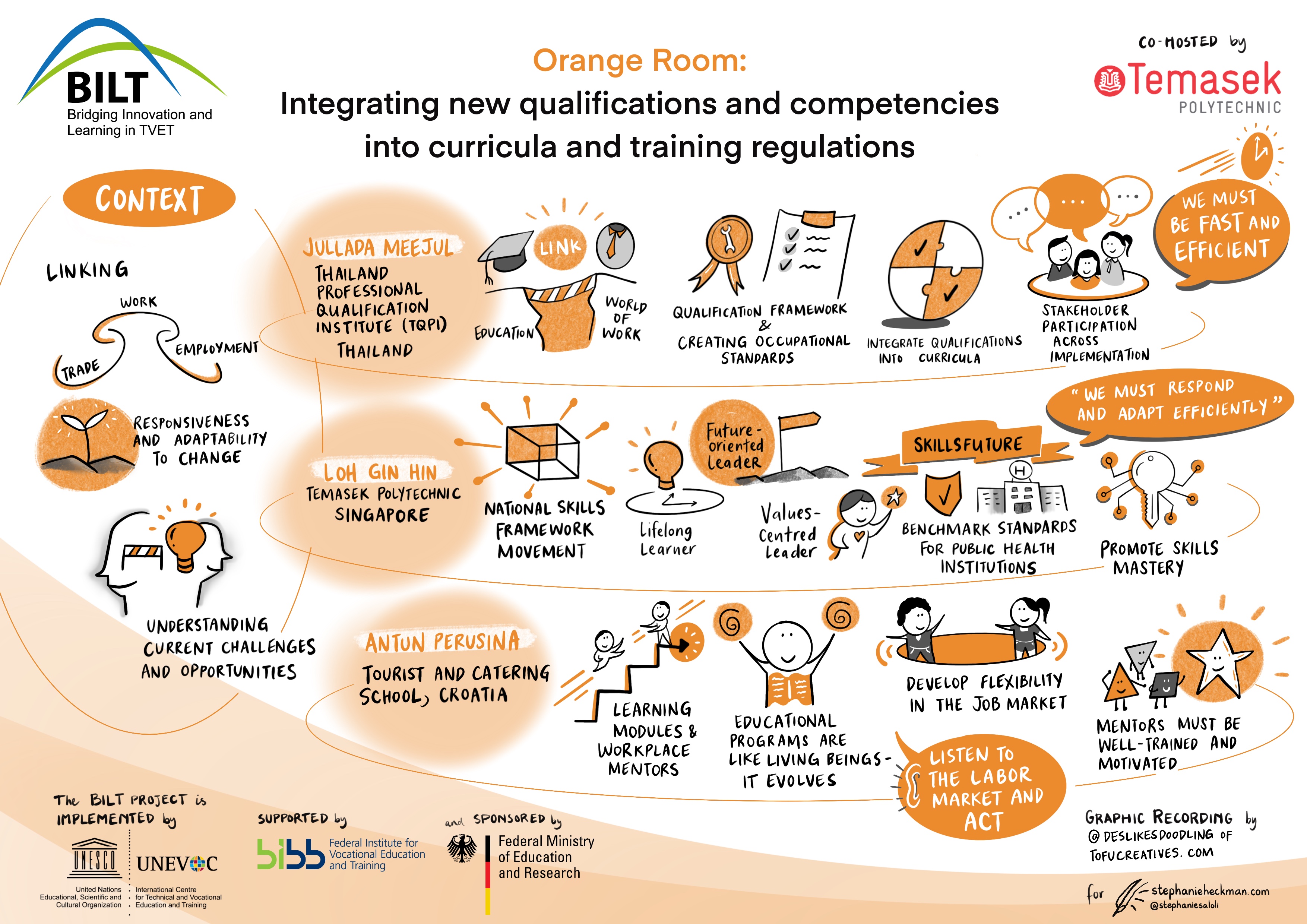 | Orange room: Integrating new qualifications and competencies into curricula and training regulations Moderated by Mr Matteo Sgarzi, Head of Mission, International Relations, Centre for Studies and Research on Qualifications (Céreq), France Objective: understand the hurdles and catalysts to design flexible and appealing curricula, increasing lifelong learning opportunities to students and learners. Explore the existing interfaces with the processes of identification and implementation. Podium speakers:
|
| Green room: Implementing new qualifications and competencies through new teaching and training approaches Moderated by Mr James Keevy, Chief Executive, JET Educational Services, South Africa Objective: take stock of the diverse institutional settings in place in Asia and Europe and how they condition the evolvement of the teaching and training practice. Podium speakers:
| |
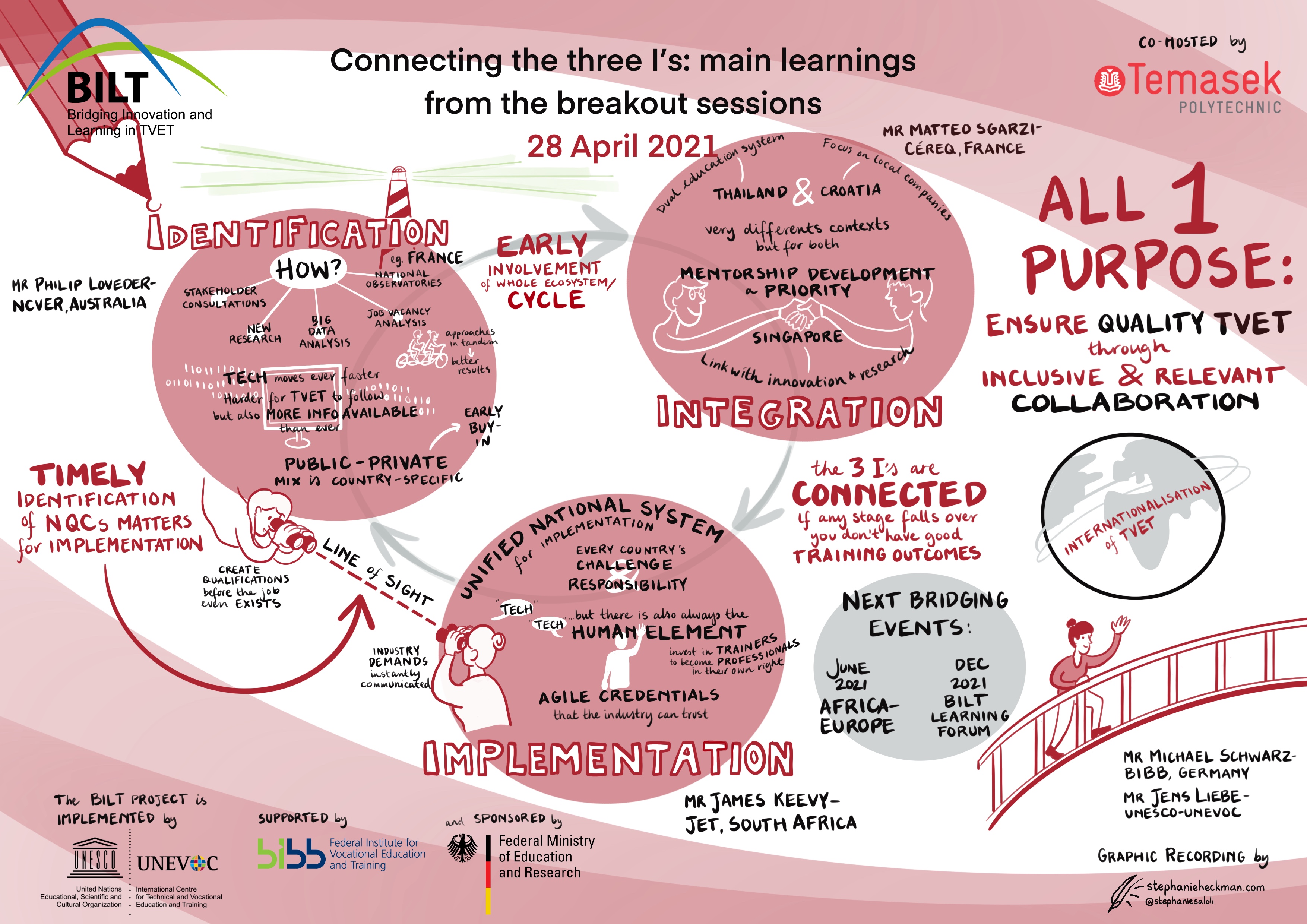 | Connecting the three I's: main learnings from the breakout sessions Moderated by Mr Mergim Jahiu, International Advisor in VET, International Relations, Swiss Federal Institute for Vocational Education and Training (SFIVET), Switzerland Objective: To present the main takeaways from each breakout session while highlighting the interplay between the identification, integration and implementation of new qualifications and competencies. Podium speakers: |
| Closing of the conference Mr Jens Liebe, Team Leader for Innovation and the Future of TVET, UNESCO-UNEVOC Mr Michael Schwarz, Senior Technical Advisor, Federal Institute for Vocational Education and Training (BIBB), Germany Objective: wrap up the event and look at the next steps for the BILT project until December 2021; highlight the existing opportunities for TVET institutions from across the globe to engage in the project’s activities. | |
| Networking & parallel information sessions Blue Room: How to submit an Innovation and Learning Practice Learn about the concept and how to submit an innovation and learning practice from your institution. Ms Alexandra Filippova, Programme Assistant, UNESCO-UNEVOC Orange Room: How to engage with the UNEVOC Network Introducing the UNEVOC Network, UNESCO's unique global platform of TVET institutions, the session is intended for TVET stakeholders that are not yet members but are interested to find out more about the network's mission and objectives, composition, and possibilities for future engagement. Mr Wouter De Regt, Team Leader for the Network Secretariat, UNESCO-UNEVOC Green Room: Micro-Learning and the Pandemic Learn how Temasek Polytechnic supports the National Effort in Continuing Education and Training during a Global Pandemic. Mr Hsien Wei Tan, Assistant Director, Business Development & Marketing, Temasek SkillsFuture Academy, Temasek Polytechnic |
The BILT project is implemented by
with support of
and sponsored by